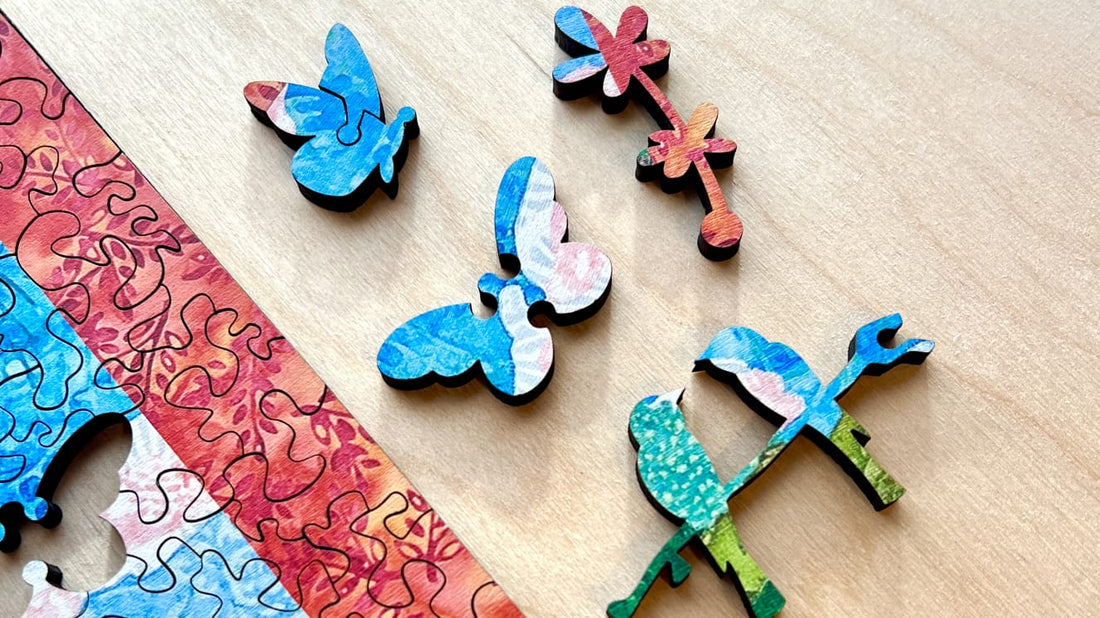Jigsaw puzzles are more than just a fun pastime. They offer significant mental health benefits, particularly for individuals dealing with ADHD, anxiety, and dementia. Engaging in puzzles can improve concentration, reduce stress, and enhance cognitive function. In this article, we will explore how jigsaw puzzles can positively impact these conditions and why they are an excellent tool for brain health.
The Mental Health Benefits of Jigsaw Puzzles
Jigsaw puzzles stimulate the brain by engaging problem-solving skills, pattern recognition, and fine motor coordination. This mental stimulation can be especially beneficial for individuals with ADHD, anxiety, and dementia. Let's dive into the specific benefits for each condition.
How Jigsaw Puzzles Help with ADHD
1. Improving Focus and Attention
Individuals with ADHD often struggle with concentration. Jigsaw puzzles require sustained attention and patience, helping individuals practice focusing on one task at a time. The structured nature of puzzles allows for gradual improvement in attention span without overwhelming the brain.
2. Enhancing Problem-Solving Skills
Solving a jigsaw puzzle involves recognizing patterns, predicting piece placement, and logical reasoning. This enhances problem-solving abilities, a crucial skill for people with ADHD who may struggle with impulsivity and decision-making.
3. Promoting Mindfulness
ADHD often comes with restless energy and difficulty sitting still. Engaging in a jigsaw puzzle encourages mindfulness by keeping the brain engaged in a non-distracting, soothing activity. This can help individuals develop patience and reduce hyperactivity.
4. Encouraging Dopamine Release
ADHD is often linked to lower dopamine levels, which affect motivation and focus. Successfully placing puzzle pieces releases dopamine, a neurotransmitter associated with pleasure and motivation. This helps reinforce positive behaviour and improves mood.
How Jigsaw Puzzles Help with Anxiety
1. Reducing Stress and Calming the Mind
Anxiety can make the mind feel overwhelmed with racing thoughts. Jigsaw puzzles offer a structured, calming activity that shifts focus away from worries and towards the present moment, reducing stress levels.
2. Enhancing Relaxation and Mindfulness
Solving puzzles requires full engagement, promoting a state of mindfulness similar to meditation. This mindfulness effect helps lower heart rate, reduce tension, and create a sense of calm.
3. Providing a Sense of Control
Anxiety can stem from feelings of uncertainty and lack of control. Completing a puzzle provides a sense of accomplishment and mastery, helping individuals regain confidence in their ability to solve problems and manage challenges.
4. Encouraging Positive Distraction
When anxious thoughts take over, engaging in a puzzle serves as a positive distraction. It shifts attention from negative thought patterns and redirects focus toward a productive and enjoyable task.
How Jigsaw Puzzles Help with Dementia
1. Strengthening Cognitive Function
Dementia affects memory, reasoning, and cognitive abilities. Regularly engaging in jigsaw puzzles stimulates different areas of the brain, helping slow cognitive decline and keeping the mind active.
2. Improving Visual-Spatial Awareness
Dementia patients often struggle with visual perception. Jigsaw puzzles require identifying shapes, colors, and patterns, which helps improve spatial awareness and hand-eye coordination.
3. Encouraging Social Interaction
Many dementia patients experience loneliness and isolation. Working on a puzzle with family members or caregivers provides an opportunity for meaningful social engagement, which is crucial for emotional well-being.
4. Enhancing Short-Term Memory
Since puzzles require remembering piece placements and patterns, they help strengthen short-term memory. Regularly engaging in puzzles can improve recall abilities and slow memory loss progression.
Best Types of Jigsaw Puzzles for ADHD, Anxiety, and Dementia
1. For ADHD:
- Puzzles with bright colors and defined patterns to maintain engagement.
- Medium-difficulty puzzles to avoid frustration.
- Timed puzzles to challenge focus and attention.
2. For Anxiety:
- Nature-themed puzzles with soothing images.
- Large-piece puzzles to prevent frustration.
- Gradual difficulty levels to maintain a relaxed approach.
3. For Dementia:
- Large-piece puzzles with clear, simple images.
- Puzzles with familiar themes (family, landscapes, animals).
- Personalized puzzles with family photos to enhance memory recall.
Final Comments
Jigsaw puzzles are a powerful, accessible tool for enhancing mental well-being. Whether helping individuals with ADHD improve focus, reducing anxiety levels, or slowing cognitive decline in dementia patients, puzzles provide significant therapeutic benefits. By incorporating jigsaw puzzles into daily routines, individuals can experience improved concentration, relaxation, and cognitive function, making them an excellent choice for brain health at any age.

